HE reader Roy Batty has convinced me that Tony Soprano got hit last night, and possibly his whole family along with him. Seriously. None of us except Batty and (I presume) a few others were sharp enough to decipher the meaning — a very obvious one, in Batty’s view — of what we saw. Here’s his explanation:
“Just how closely did people who call themselves fans pay attention last night? The writing is not only on the wall — it’s on the floor, the ceiling and fluttering from a banner over the entrance: Tony and probably the family got hit.
“I didn’t think so just after it had ended, believing like many that David Chase had simply set up some sort of bullshit ambiguous ending to engender debate. I argued that had something happened, we would not have seen Meadow enter the diner. And that she was meant, as the person least connected to Tony’s blood money, to survive because of her distance from the family.
“But I was just going on surface information and not really considering all the things that make it impossible to ignore. While most are in the form of metaphors and callbacks to past characters, the single biggest signpost that is a virtual headstone is the flashback to Bobby and Tony in the boat talking about what it’s like to be killed.
“Bobby says you don’t see it coming and it’s just over. The show then ends with a ‘smash cut’ to black. It doesn’t get any clearer than that.
“I think too many people are pissed that Chase didn’t end it the way they had written in their minds or hate the idea that Tony, et. al. are gone. I don’t know if it was brilliant, but not seen through glasses of denial it’s pretty clear.”
“The Hustler” again
How much better can you make a 1961 black-and-white CinemaScope film look? I’ve always loved Robert Rossen‘s The Hustler (particularly that revolutionary opening-credit sequence), and I would probably buy a Blu-Ray DVD of it. (That is, if I had a Blu-Ray player and a first-rate high-def monitor.) But what could I possibly expect to get from this brand-new double-disc DVD get that would amount to a genuine visual upgrade?
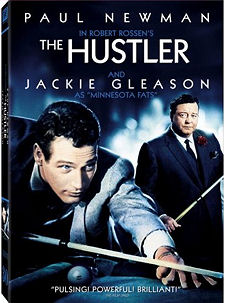
Moore vs. Bush’s OFAC
It’s been claimed that Michael Moore‘s criticism of the Bush administration’s health-care politicies may have prompted a federal investigation into his trip to Cuba for the upcoming health-care documentary, Sicko. In a letter to the U.S. Treasury Department’s Office of Foreign Assets Control, attorney David Boies noted that Moore has been a constant Bush critic for years, and “for this reason, I am concerned that Moore has been selected for discriminatory treatment by your office.” This is…what, a hypothesis? As in “this may have been the case”?
Van Sant’s “Acid Test”
Right off the bat, a line in Michael Fleming‘s story about Gus Van Sant‘s yet-to-be-written adaptation of Tom Wolfe’s The Electric Kool-Aid Acid Test gives pause. I’m speaking of the Variety columnist writing that “it’s likely Wolfe will not be a major character in the film, which will focus on Kesey and include events that occurred after the road trip.”
Sorry, but this falls under the heading of a Big Mistake. If you’re going to make a film that’s mainly about a bunch of visionary free spirits ripped on acid and driving a psychedelic bus around the country, you need an against-the-flow punctuation character — a dispassionate overview guy wearing a suit and taking notes and not dropping tabs. Obviously! Anyone who knows the first thing about writing ensemble pieces will tell you this.
Because the entire universe is contained in every blade of grass, I’m afraid the Wolfe deletion is a serious stopper for Van Sant’s Kool-Aid project. Without a Wolfe character the film will be a little too Even Cowgirls Get The Blues. Too crazy-60s monotonous, too indulgent-flamboyant. Ken Kesey this, Neil Casady that, etc. Bring in Wolfe and we’ll talk but without him, forget it.
“Evan Almighty” reaction
Evan Almighty (Universal, 6.22) had a big family-style premiere and after-party on the Universal lot last weekend, and a friend who attended says “it’s funny and entertaining, but it’s basically a pro-environment rip on the Republicans and — if you want to take it this far — the self-serving politicians who didn’t build the New Orleans levees properly, which is what made Hurricane Katrina so devastating.

There’s a third-act plot spoiler coming three paragraphs from now…fair warning.
“Kids and families will love it, the special-effects are great, and It’s just a really nice alpha-vibe, do-good, love-the-earth movie. The theme of the movie is ‘ark’ — acts of random kindness.
“Steve Carrell is very funny and Morgan Freeman delivers his usual smooth professional job, but they gave all the best laugh lines – disbelieving skeptical reacton lines — to Wanda Sykes, a black comedienne. There’s a funny visual riff on one of Carell’s earlier films, but I won’t tell you what it is. This is only a 90 minute movie, by the way, which makes it even more kid-friendly, or tyke-friendly.
SPOILER: Freeman’s God calls upon Carell’s Congressman to build the ark to prepare for the big rains on September 22nd.” (Why that date in particular?) “And then the rains come and then…perhaps I shouldn’t say. Suffice that the real focus of this film isn’t God’s wrath but Man’s greed. It turns out there’s been a man-made dambreak that causes this gigantic flood, and it’s mainly the fault of a pro-business Congressman played by John Goodman who’s been helping his fat-cat pallies buy lots of land in parks and then winking at their short-cut moves (i.e., not building a dam properly).
“This movie is a throwback to the Oh, God movies,” the observer says. “The end result is always that the main character — Carrell’s, in this instance — becomes enlightened.”
Hilton talks to Walters
“I know now that I can make a difference, that I have the power to do that. I have been thinking that I want to do different things when I am out of here. I have become much more spiritual. God has given me this new chance.” — An incarcerated Paris Hilton speaking to Barbara Walters in a Sunday afternoon (6.10) phone interview.
Have splatter-horror films lost their bite?
Did the measley $8.8 million earned by Hostel, Part II “put a nail in the coffin of a dying horror boom last weekend,” as N.Y. Times guy Michael Ciepley contends? Did the moral revulsion factor (i.e., which I realize doesn’t apply as far as Las Vegas-residing Hispanic mothers with 15 month-old daughters are concerned) have at least something to do with this?
Abortion is a Hollywood no-show
If I were Katherine Heigl and I’d just discovered I’ve been impregnated by a beefy, no-account slacker like Seth Rogen, I would run, not walk, to the nearest recommended abortionist. But of course, as N.Y. Times writer Mireya Navarro points out, this option doesn’t exist in mainstream films like Knocked Up and Waitress.
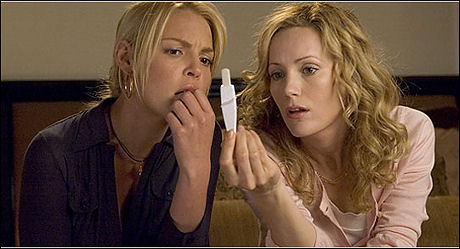
“Though conservatives regularly accuse Hollywood of being overly liberal on social issues, abortion rarely comes up in film,” she writes.
“Real-life women struggling with unwanted pregnancies might consider an abortion, have intense discussions with partners and friends about it and, in most cases, go through with it. But historically and to this day in television and film — historians, writers and those in the movie industry say — a character in such straits usually conveniently miscarries or decides to keep the baby.
Up-in-the-air endings
A distinguished filmed drama about a constant fearsome menace is about to end. This is quite an event considering the weight and gravitas provided thus far. After all, many fans and critics have pointed out that this highly-touted, much-watched drama is as much about what it connotes, explores and portends about all of us — our lives, our culture, our deep-down values — as the specific subject matter at hand.
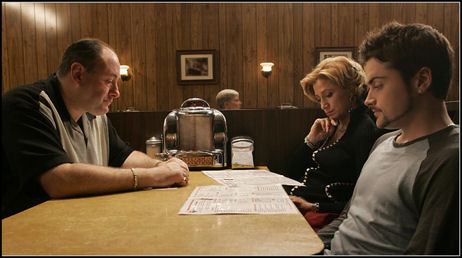
In any event, the finale arrives with many people having died, some horrifically, and now the big question: will this dark, resonant work deliver a grand cathartic finale? The answer is no. It ends without any kind of real “ending.” Clearly, the ominous last scene implies more horrific things to come, but what is shown leaves literal-minded audience members hanging and going, “What the…?” and “That’s it?”
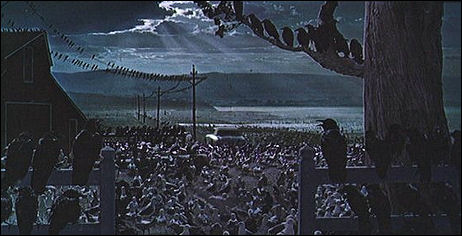
I’m speaking, of course, about the finale of Alfred Hitchcock‘s The Birds. Audiences who came out to see this classic film in March 1963 were hugely disappointed with the wrap-up. I’ve heard stories of people groaning and booing when they realized there wouldn’t be any kind of sudden jolt or “aha!” turnabout. Rod Taylor, Tippi Hedren, Jessica Tandy, little Veronica Cartwright and those two love birds slowly driving away at dawn as tens of thousands of birds just sit and watch…huh?
“Sopranos” finale
Tony Soprano lives on in perpetual dread and uncertainty — unpunctured, undead, and prevailing after a fashion. That, for better or worse, is what the final episode of The Sopranos left viewers with this evening.
And anyone who writes in complaining that I’m spoiling the party by writing this can go stuff it. A comprehensive sum-up piece by the AP’s Frazier Moore went up at 11:50 pm eastern, Nikki Finke ran a negative reaction piece even earlier, and finale details are all over Monday morning’s N.Y. Post.
So far, there seems to be disappointment out there that a hitman’s bullet or at least some sort of bad-karma payback didn’t befall bossman Soprano, although I’d suspected this might be how the last episode would end.
The coolest moment in the finale was the glorious death of Phil Leotardo — not just shot in the head and chest, but his head accidentally squashed like a pumpkin by an accidentally rolling SUV. It was one of the two funniest bits, the other being that orange cat staring at a wall photo of the late Christopher Moltisanti, and Paulie Walnuts getting increasingly pissed at the animal for its odd behavior.
There’s tension galore in the final sequence as Tony, Carmela, Meadow and A.J. gather for dinner at a blue-collar family restaurant. You can feel something bad coming…a hit, probably. Maybe all four family members (good God) getting it at the same time. Guys come in and you wonder if it’s this one or that one who’ll pull out a pistol with a silencer. The tension builds and builds, and then cut to black — no catharsis, no grand finale.
It was, in fact, about as far away from an eye-opening, jaw-dropping finish as anyone could have concocted, and I imagine most people who saw it last night were a bit pissed about this, or at the very least underwhelmed. I myself was taken aback, but I thought about it for a few minutes and decided I respected Chase for having the brass to essentially tell the fans who wanted a “big finale” to go fuck themselves.
The N.Y. Post headlines are a scream — ‘SOPRANOS” FINALE WHACKS FANS….SHOW’S FINALE FIRES ‘BLANKS’…DARK SCREEN CAPS DISAPPOINTING WRAP…PHIL’S GRISLY HIT IS THE LONE HIGHLIGHT.
N.Y. Times columnist Alessandra Stanley put it thusly: “Mr. Chase’s last joke was on his audience, not his characters. Tony, Carmela and A. J. are gathered at a diner in a rare moment of family content that cried out for violent interruption. A shifty-looking man walks in and eyes them from the counter, then, in a move echoing a scene from The Godfather, ominously enters the men’s room. Outside, Meadow is delayed, trying to parallel park, then begins walking toward the restaurant.
“Nothing happens. Credits. What?”
Vantage Point
Here’s a trailer for what seems like an above-average thriller called Vantage Point, from director Pete Travis (who comes from TV), about an attempted assassination of a U.S. president (William Hurt) that’s told from five different points of view.

Forest Whitaker, Matthew Fox, Dennis Quaid and Sigourney Weaver costar. Probably just another jolt movie, most likely. It won’t open until 2.15.08 — eight months from now. The only uh-oh factor is that it’s a Sony Pictures release, and you know the dark-side karma those guys bring to everything they do and every movie they touch. (Except for the fluke of their funding and releasing Mike Binder‘s Reign O’er Me.)
Vegas view
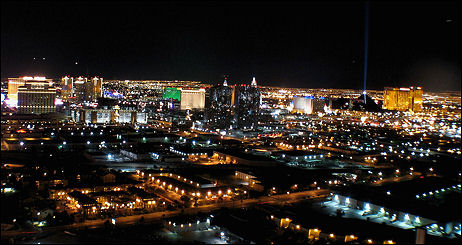
The view always looks cool with the naked eye from the roof of the Palms hotel, and it always disappoints when you look at the photos you’ve taken — Saturday, 6.9.07, 10:10 pm

